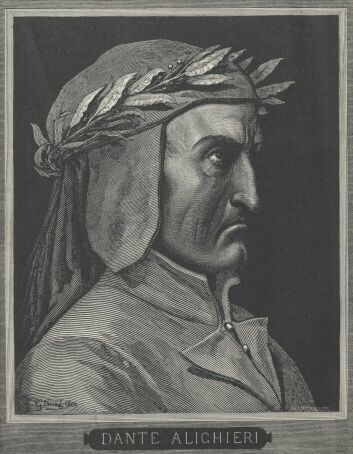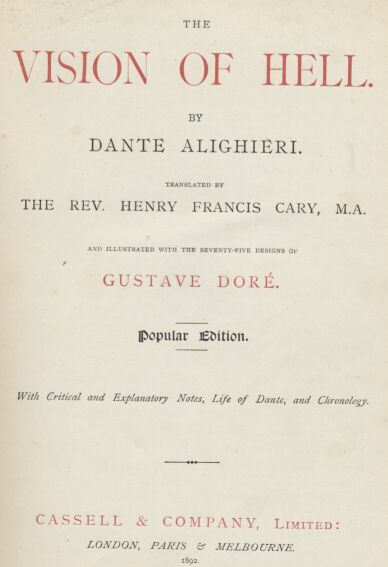CANTO V
FROM the first circle I descended thus
Down to the second, which, a lesser space
Embracing, so much more of grief contains
Provoking bitter moans. There, Minos stands
Grinning with ghastly feature: he, of all
Who enter, strict examining the crimes,
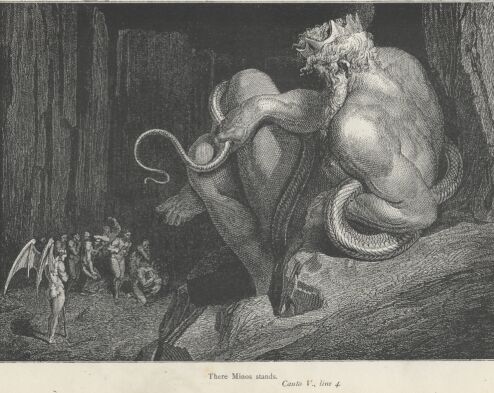
Gives sentence, and dismisses them beneath,
According as he foldeth him around:
For when before him comes th' ill fated soul,
It all confesses; and that judge severe
Of sins, considering what place in hell
Suits the transgression, with his tail so oft
Himself encircles, as degrees beneath
He dooms it to descend. Before him stand
Always a num'rous throng; and in his turn
Each one to judgment passing, speaks, and hears
His fate, thence downward to his dwelling hurl'd.
"O thou! who to this residence of woe
Approachest?" when he saw me coming, cried
Minos, relinquishing his dread employ,
"Look how thou enter here; beware in whom
Thou place thy trust; let not the entrance broad
Deceive thee to thy harm." To him my guide:
"Wherefore exclaimest? Hinder not his way
By destiny appointed; so 'tis will'd
Where will and power are one. Ask thou no more."
Now 'gin the rueful wailings to be heard.
Now am I come where many a plaining voice
Smites on mine ear. Into a place I came
Where light was silent all. Bellowing there groan'd
A noise as of a sea in tempest torn
By warring winds. The stormy blast of hell
With restless fury drives the spirits on
Whirl'd round and dash'd amain with sore annoy.
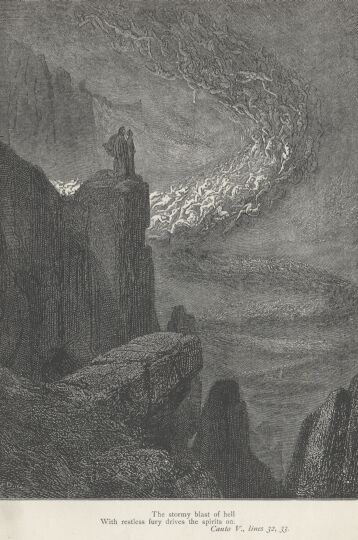
When they arrive before the ruinous sweep,
There shrieks are heard, there lamentations, moans,
And blasphemies 'gainst the good Power in heaven.
I understood that to this torment sad
The carnal sinners are condemn'd, in whom
Reason by lust is sway'd. As in large troops
And multitudinous, when winter reigns,
The starlings on their wings are borne abroad;
So bears the tyrannous gust those evil souls.
On this side and on that, above, below,
It drives them: hope of rest to solace them
Is none, nor e'en of milder pang. As cranes,
Chanting their dol'rous notes, traverse the sky,
Stretch'd out in long array: so I beheld
Spirits, who came loud wailing, hurried on
By their dire doom. Then I: "Instructor! who
Are these, by the black air so scourg'd?"—"The first
'Mong those, of whom thou question'st," he replied,
"O'er many tongues was empress. She in vice
Of luxury was so shameless, that she made
Liking be lawful by promulg'd decree,
To clear the blame she had herself incurr'd.
This is Semiramis, of whom 'tis writ,
That she succeeded Ninus her espous'd;
And held the land, which now the Soldan rules.
The next in amorous fury slew herself,
And to Sicheus' ashes broke her faith:
Then follows Cleopatra, lustful queen."
There mark'd I Helen, for whose sake so long
The time was fraught with evil; there the great
Achilles, who with love fought to the end.
Paris I saw, and Tristan; and beside
A thousand more he show'd me, and by name
Pointed them out, whom love bereav'd of life.
When I had heard my sage instructor name
Those dames and knights of antique days, o'erpower'd
By pity, well-nigh in amaze my mind
Was lost; and I began: "Bard! willingly
I would address those two together coming,
Which seem so light before the wind." He thus:
"Note thou, when nearer they to us approach.
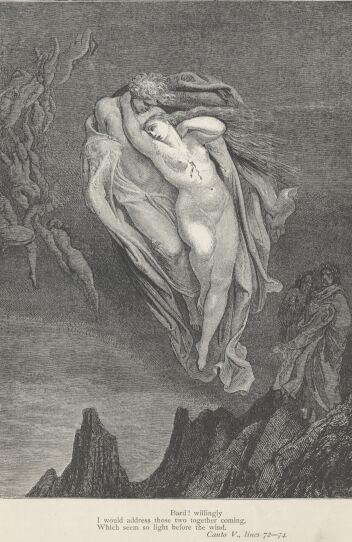
"Then by that love which carries them along,
Entreat; and they will come." Soon as the wind
Sway'd them toward us, I thus fram'd my speech:
"O wearied spirits! come, and hold discourse
With us, if by none else restrain'd." As doves
By fond desire invited, on wide wings
And firm, to their sweet nest returning home,
Cleave the air, wafted by their will along;
Thus issu'd from that troop, where Dido ranks,
They through the ill air speeding; with such force
My cry prevail'd by strong affection urg'd.
"O gracious creature and benign! who go'st
Visiting, through this element obscure,
Us, who the world with bloody stain imbru'd;
If for a friend the King of all we own'd,
Our pray'r to him should for thy peace arise,
Since thou hast pity on our evil plight.
()f whatsoe'er to hear or to discourse
It pleases thee, that will we hear, of that
Freely with thee discourse, while e'er the wind,
As now, is mute. The land, that gave me birth,
Is situate on the coast, where Po descends
To rest in ocean with his sequent streams.
"Love, that in gentle heart is quickly learnt,
Entangled him by that fair form, from me
Ta'en in such cruel sort, as grieves me still:
Love, that denial takes from none belov'd,
Caught me with pleasing him so passing well,
That, as thou see'st, he yet deserts me not.
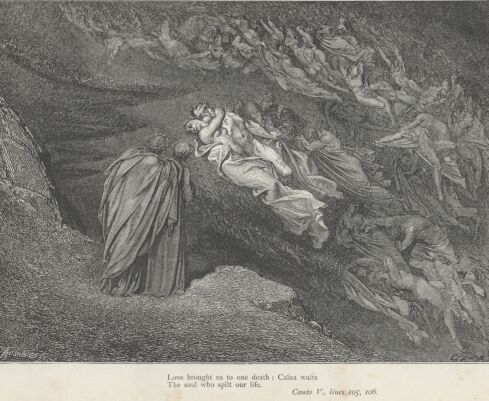
"Love brought us to one death: Caina waits
The soul, who spilt our life." Such were their words;
At hearing which downward I bent my looks,
And held them there so long, that the bard cried:
"What art thou pond'ring?" I in answer thus:
"Alas! by what sweet thoughts, what fond desire
Must they at length to that ill pass have reach'd!"
Then turning, I to them my speech address'd.
And thus began: "Francesca! your sad fate
Even to tears my grief and pity moves.
But tell me; in the time of your sweet sighs,
By what, and how love granted, that ye knew
Your yet uncertain wishes?" She replied:
"No greater grief than to remember days
Of joy, when mis'ry is at hand! That kens
Thy learn'd instructor. Yet so eagerly
If thou art bent to know the primal root,
From whence our love gat being, I will do,
As one, who weeps and tells his tale. One day
For our delight we read of Lancelot,
How him love thrall'd. Alone we were, and no
Suspicion near us. Ofttimes by that reading
Our eyes were drawn together, and the hue
Fled from our alter'd cheek. But at one point
Alone we fell. When of that smile we read,
The wished smile, rapturously kiss'd
By one so deep in love, then he, who ne'er
From me shall separate, at once my lips
All trembling kiss'd. The book and writer both
Were love's purveyors. In its leaves that day
We read no more." While thus one spirit spake,
The other wail'd so sorely, that heartstruck
I through compassion fainting, seem'd not far
From death, and like a corpse fell to the ground.
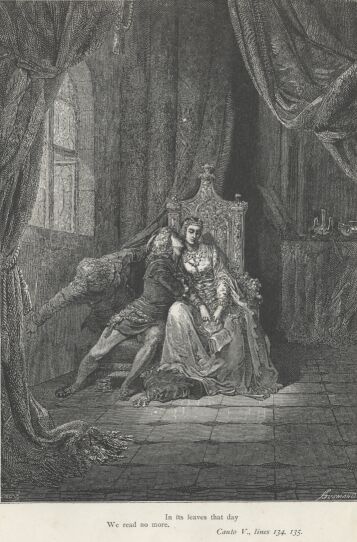
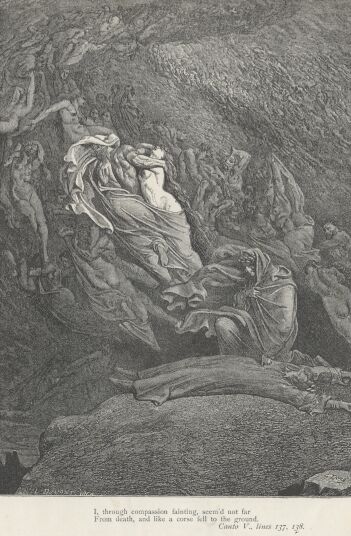
CANTO VI
MY sense reviving, that erewhile had droop'd
With pity for the kindred shades, whence grief
O'ercame me wholly, straight around I see
New torments, new tormented souls, which way
Soe'er I move, or turn, or bend my sight.
In the third circle I arrive, of show'rs
Ceaseless, accursed, heavy, and cold, unchang'd
For ever, both in kind and in degree.
Large hail, discolour'd water, sleety flaw
Through the dun midnight air stream'd down amain:
Stank all the land whereon that tempest fell.
Cerberus, cruel monster, fierce and strange,
Through his wide threefold throat barks as a dog
Over the multitude immers'd beneath.
His eyes glare crimson, black his unctuous beard,
His belly large, and claw'd the hands, with which
He tears the spirits, flays them, and their limbs
Piecemeal disparts. Howling there spread, as curs,
Under the rainy deluge, with one side
The other screening, oft they roll them round,
A wretched, godless crew. When that great worm
Descried us, savage Cerberus, he op'd
His jaws, and the fangs show'd us; not a limb
Of him but trembled. Then my guide, his palms
Expanding on the ground, thence filled with earth
Rais'd them, and cast it in his ravenous maw.
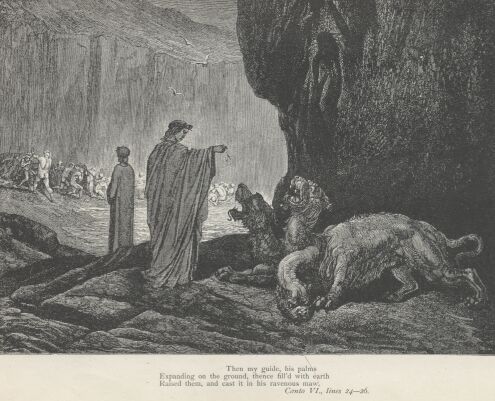
E'en as a dog, that yelling bays for food
His keeper, when the morsel comes, lets fall
His fury, bent alone with eager haste
To swallow it; so dropp'd the loathsome cheeks
Of demon Cerberus, who thund'ring stuns
The spirits, that they for deafness wish in vain.
We, o'er the shades thrown prostrate by the brunt
Of the heavy tempest passing, set our feet
Upon their emptiness, that substance seem'd.
They all along the earth extended lay
Save one, that sudden rais'd himself to sit,
Soon as that way he saw us pass. "O thou!"
He cried, "who through the infernal shades art led,
Own, if again thou know'st me. Thou wast fram'd
Or ere my frame was broken." I replied:
"The anguish thou endur'st perchance so takes
Thy form from my remembrance, that it seems
As if I saw thee never. But inform
Me who thou art, that in a place so sad
Art set, and in such torment, that although
Other be greater, more disgustful none
Can be imagin'd." He in answer thus:
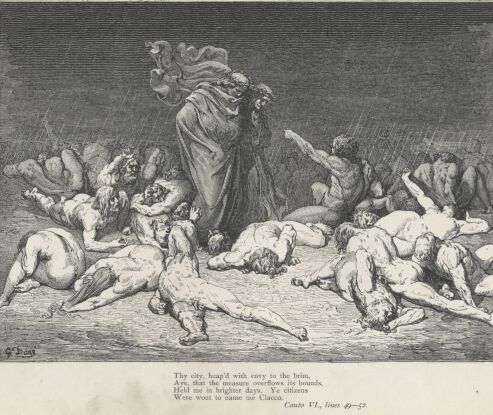
"Thy city heap'd with envy to the brim,
Ay that the measure overflows its bounds,
Held me in brighter days. Ye citizens
Were wont to name me Ciacco. For the sin
Of glutt'ny, damned vice, beneath this rain,
E'en as thou see'st, I with fatigue am worn;
Nor I sole spirit in this woe: all these
Have by like crime incurr'd like punishment."
No more he said, and I my speech resum'd:
"Ciacco! thy dire affliction grieves me much,
Even to tears. But tell me, if thou know'st,
What shall at length befall the citizens
Of the divided city; whether any just one
Inhabit there: and tell me of the cause,
Whence jarring discord hath assail'd it thus?"
He then: "After long striving they will come
To blood; and the wild party from the woods
Will chase the other with much injury forth.
Then it behoves, that this must fall, within
Three solar circles; and the other rise
By borrow'd force of one, who under shore
Now rests. It shall a long space hold aloof
Its forehead, keeping under heavy weight
The other oppress'd, indignant at the load,
And grieving sore. The just are two in number,
But they neglected. Av'rice, envy, pride,
Three fatal sparks, have set the hearts of all
On fire." Here ceas'd the lamentable sound;
And I continu'd thus: "Still would I learn
More from thee, farther parley still entreat.
Of Farinata and Tegghiaio say,
They who so well deserv'd, of Giacopo,
Arrigo, Mosca, and the rest, who bent
Their minds on working good. Oh! tell me where
They bide, and to their knowledge let me come.
For I am press'd with keen desire to hear,
If heaven's sweet cup or poisonous drug of hell
Be to their lip assign'd." He answer'd straight:
"These are yet blacker spirits. Various crimes
Have sunk them deeper in the dark abyss.
If thou so far descendest, thou mayst see them.
But to the pleasant world when thou return'st,
Of me make mention, I entreat thee, there.
No more I tell thee, answer thee no more."
This said, his fixed eyes he turn'd askance,
A little ey'd me, then bent down his head,
And 'midst his blind companions with it fell.
When thus my guide: "No more his bed he leaves,
Ere the last angel-trumpet blow. The Power
Adverse to these shall then in glory come,
Each one forthwith to his sad tomb repair,
Resume his fleshly vesture and his form,
And hear the eternal doom re-echoing rend
The vault." So pass'd we through that mixture foul
Of spirits and rain, with tardy steps; meanwhile
Touching, though slightly, on the life to come.
For thus I question'd: "Shall these tortures, Sir!
When the great sentence passes, be increas'd,
Or mitigated, or as now severe?"
He then: "Consult thy knowledge; that decides
That as each thing to more perfection grows,
It feels more sensibly both good and pain.
Though ne'er to true perfection may arrive
This race accurs'd, yet nearer then than now
They shall approach it." Compassing that path
Circuitous we journeyed, and discourse
Much more than I relate between us pass'd:
Till at the point, where the steps led below,
Arriv'd, there Plutus, the great foe, we found.
|

